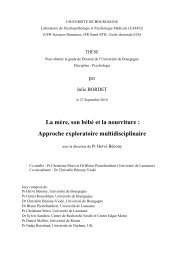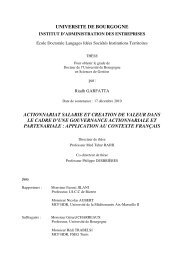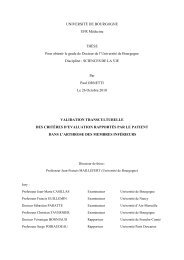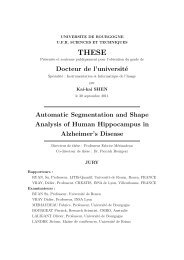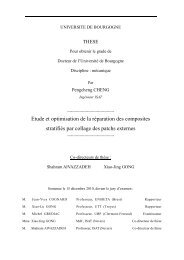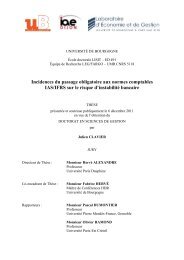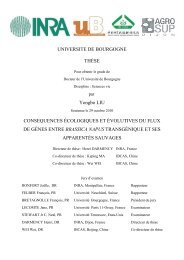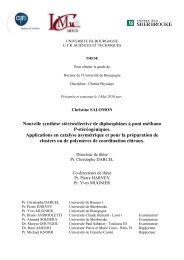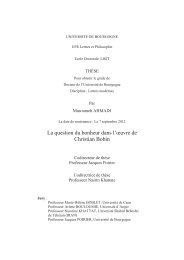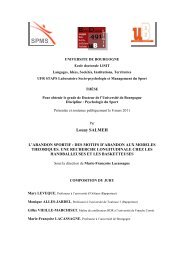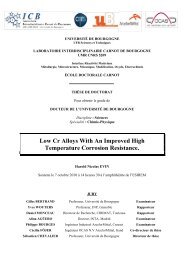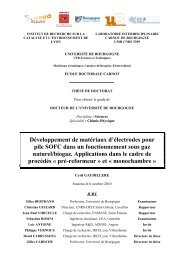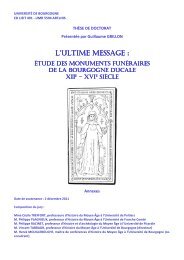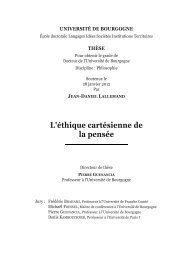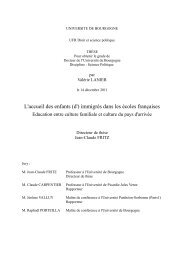Diversifying crop rotations with temporary grasslands - Université de ...
Diversifying crop rotations with temporary grasslands - Université de ...
Diversifying crop rotations with temporary grasslands - Université de ...
You also want an ePaper? Increase the reach of your titles
YUMPU automatically turns print PDFs into web optimized ePapers that Google loves.
PFCs might inhibit the successful germination, growth and reproduction of weed species that<br />
are adapted to annual <strong>crop</strong>s but may favour the growth of other species at the same time<br />
resulting in plant community shifts. Such community shifts were observed in a large-scale<br />
weed surveys in Canada (Ominski et al., 1999) and recently in France (Meiss et al., 2010a;<br />
Meiss et al., 2010b) and are also suggested by several field experiments (reviewed in Meiss et<br />
al., 2010a).<br />
Un<strong>de</strong>rstanding the mechanisms involved in the observed effects is necessary for generalizing<br />
the results, for un<strong>de</strong>rstanding the potential antagonistic observations reported by some authors,<br />
and for <strong>de</strong>veloping predictive mo<strong>de</strong>ls. Previous experiments frequently confoun<strong>de</strong>d the<br />
differences between annual and perennial <strong>crop</strong>s (cited above) <strong>with</strong> differences in herbici<strong>de</strong><br />
treatments, as PFCs are frequently characterized by reduced herbici<strong>de</strong> treatments or the use of<br />
herbici<strong>de</strong>s <strong>with</strong> other active ingredients (Summers, 1998; Meiss et al., 2010a). However,<br />
besi<strong>de</strong>s the strong and rather well-known effects of herbici<strong>de</strong>s, many other differences<br />
between annual and perennial <strong>crop</strong>s may impact the weed species composition, that are not<br />
well un<strong>de</strong>rstood.<br />
In this manuscript, it will first be analyzed which weed species are favoured and suppressed in<br />
annual and perennial <strong>crop</strong>s. Then, the impacts of contrasted <strong>crop</strong> management options will be<br />
analyzed (including <strong>crop</strong> species, sowing date and cutting frequency in the perennial <strong>crop</strong>s and<br />
management options of the inter<strong>crop</strong>s between successive annual <strong>crop</strong>s). Finally, these results<br />
will be used to investigate and discuss the un<strong>de</strong>rlying mechanisms of the impacts on weeds.<br />
A 2.5-year field experiment was set up to compare the population dynamics of different<br />
common annual weed species between PFCs and a succession of annual <strong>crop</strong>s. For the<br />
perennial <strong>crop</strong>s, six <strong>crop</strong> management treatments were compared that differed by three factors:<br />
1) the <strong>crop</strong> species, opposing a legume and a grass <strong>crop</strong>, which differ e.g. in establishment<br />
and growth dynamics, symbiotic nitrogen fixation and fertilisation, hence affecting <strong>crop</strong>-weed<br />
competition and other weed growth conditions; 2) the sowing date, opposing autumn and<br />
spring sowing, which is known to affect weed recruitment in annual <strong>crop</strong>s (Hald, 1999); and<br />
3) the <strong>crop</strong> cutting frequency, which may have strong impacts on weed plant survival and<br />
seed production. These three factors were partially combined in or<strong>de</strong>r to create a variety of<br />
weed growth conditions. These perennial <strong>crop</strong> treatments were compared to a succession of<br />
annual cereal <strong>crop</strong>s which differed in various aspects to the perennial <strong>crop</strong>s including soil<br />
tillage, <strong>crop</strong> growth dynamics, and harvesting dates (only one cereal harvest per year). For the<br />
72



